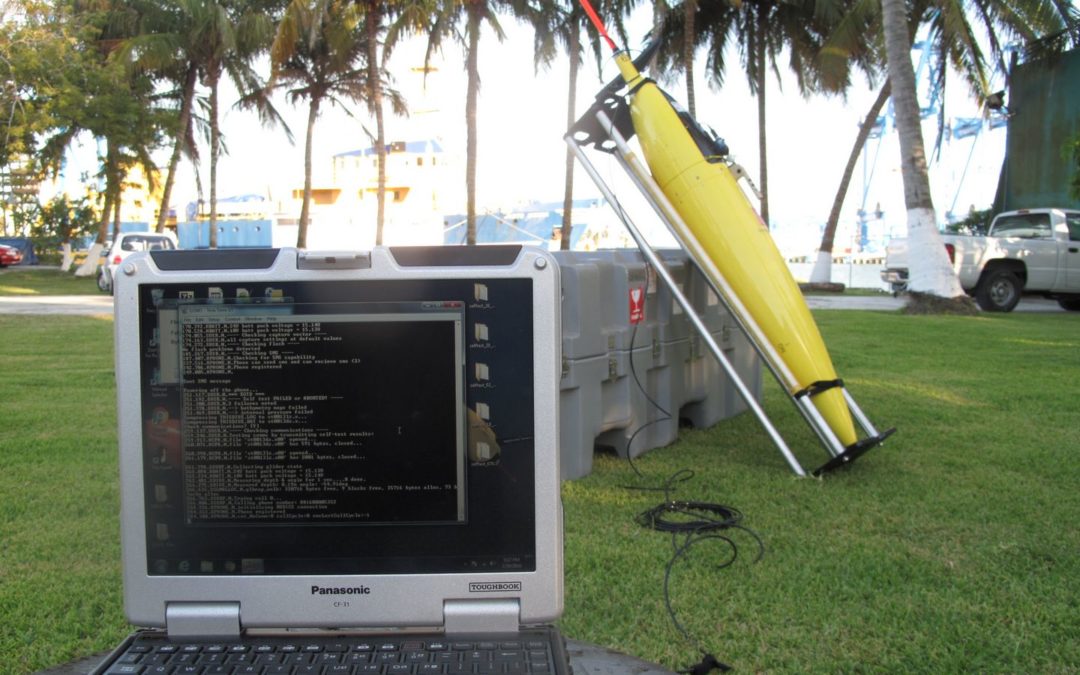Job summary and role
The Group of Monitoring of the Ocean with Gliders (GMOG) is looking for professional to serve as computational engineer. GMOG was founded on 2016 to contribute to the monitoring efforts of the project “Implementación de redes de observaciones oceanográficas (físicas, geoquímicas, ecológicas) para la generación de escenarios ante posibles contingencias relacionadas a la exploración y producción de hidrocarburos en aguas profundas del Golfo de México” developped by the Gulf of Mexico Research Consortium (CIGoM).
Your primary role will be as computational lead engineer for our group. You will be responsible for the data managing, processing, and data flow of a variety of databases, mainly Seaglider data, but also other data sources such as drifter data, mooring data, remote sensing data on a wide variety of environmental monitoring projects in the Gulf of Mexico.
Principle duties include using Unix-based computer systems to manipulate data, and evaluating quality control procedures of the physical oceanographic data collected. Under varying levels of guidance, computational technician supports the basestation software deficiencies, writes computer scripts, and implements basic corrections to background processes in consultation with science principal investigators. Utilizes grade-level proficiency in Unix-based and PC computer systems to identify, report and recommend mitigation of inefficiencies in Seaglider specialized data analysis software.
The computational technician will be encouraged, as secondary duty, to participate in conducting Command and Control (C2) of Seaglider systems, evaluating physical oceanographic data to validate sensor performance, and taking established procedural actions when sensors experience casualties.
Main duties:
- Uses Matlab and Python programming languages for basestation maintenance, data processing and analysis.
Secondary duties:
- Uses Unix-based computer systems for Seaglider.
- Makes adjustments to Seaglider system parameters based on the environment and system health.
The ideal candidate
We are looking for an enthusiastic individual who will enjoy the varied nature of the post and the challenge of working in scientific research, specifically in oceanography. You will be flexible and organized, able to work closely with other technicians, have excellent problem-solving skills, and take a pro-active approach in your work. Ideal candidates are those who have the desire to learn, are agile and readily adapt to rapidly evolving technology, and can perform a wide range of tasks in an Operational watch floor environment. It is recommended to have hands-on experience with underwater vehicles, conveniently with Seagliders, but more importantly be proficient in the use of Matlab and Python programming languages.
Support
You will have support from the Group of Monitoring of the Ocean with Gliders (GMOG; https://gliders.cicese.mx/), which includes a web technician and a glider piloting technicians, as well as science Principal Investigators to assist your success in planning and conducting the different background processes.
What we can offer you
This could be an opportunity to put your strengths to work and bring new ideas, which complement our existing small but highly competent team. We are using cutting edge marine technology and measurement sensors such as Seagliders and acoustic Doppler current profilers, respectively. Determine which configuration and implement a high quality data processing is still challenging.
Or you might be looking for a career opportunity and change in lifestyle or location?
We are based on the beautiful northwestern Pacific coast of Mexico – Ensenada, Baja California – at the Centro de Investigación Científica y Educación Superior de Ensenada (CICESE; https://www.cicese.edu.mx/), the central and South America most renowned oceanographic research institution. The state of Baja California, among his beautiful beaches and very nice “Mediterranean” climate, is famous because of the Guadalupe Valley, which is Mexico’s premier wine region, producing 90% of all of the wine that comes from Mexico.
How to apply
Email to the science Principal Investigators of GMOG: Enric Pallas Sanz (epallas@cicese.mx) and Miguel Tenreiro (tenreiro@cicese.mx) with the following documentation:
1.- Curriculum Vitae
2.- Letter of Intention
3.- Three contacts for professional references
The closing date for receipt of applications is September 5 th , 2021.
The deadline to provide documentation ends on September 5 th .
The interviews will be hold as the applications are being received. The job will start by mid September.
Relevant links:


Comentarios recientes